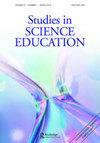Effects of games in STEM education: a meta-analysis on the moderating role of student background characteristics
IF 9.9
2区 教育学
Q1 EDUCATION & EDUCATIONAL RESEARCH
引用次数: 9
Abstract
ABSTRACT Game-based learning has proven to be effective and is widely used in science education, but usually the heterogeneity of the student population is being overlooked. To examine the differential effects of game interventions in STEM (Science, Technology, Engineering and Mathematics) related subjects on diverse student groups, a meta-analysis has been conducted that included 39 studies that compared game-based learning interventions with traditional classrooms in primary and early secondary education. We found moderate positive effects on cognition (g = .67), motivation (g = .51), and behaviour (g = .93). Additionally, substantial heterogeneity between studies was found. Moderator analyses indicated that primary school students achieve higher learning outcomes and experience game interventions as more motivating than secondary school students, whereas gender did not have any moderating effect. There were too few studies reporting information on the remaining moderators (socioeconomic status, migration background, and special educational needs) to include them in a multiple meta-regression model. Therefore, we assessed their role by separate moderator analyses, but these results need to be interpreted with caution. Additional descriptive analyses suggested that game-based learning may be less beneficial for students with low socioeconomic status compared to students with high socioeconomic status.游戏在STEM教育中的作用:学生背景特征调节作用的荟萃分析
摘要:基于游戏的学习已被证明是有效的,并在科学教育中广泛应用,但通常忽略了学生群体的异质性。为了检验STEM(科学、技术、工程和数学)相关科目的游戏干预对不同学生群体的不同影响,进行了一项荟萃分析,其中包括39项研究,将基于游戏的学习干预与小学和初中教育的传统课堂进行了比较。我们发现对认知(g=.67)、动机(g=.51)和行为(g=.93)有适度的积极影响。此外,研究之间存在显著的异质性。主持人分析表明,小学生的学习成绩更高,游戏干预比中学生更有激励性,而性别没有任何调节作用。报告剩余调节因子(社会经济地位、移民背景和特殊教育需求)信息的研究太少,无法将其纳入多元元回归模型。因此,我们通过单独的调节因子分析来评估它们的作用,但这些结果需要谨慎解读。其他描述性分析表明,与社会经济地位高的学生相比,基于游戏的学习对社会经济地位低的学生可能没有那么有益。
本文章由计算机程序翻译,如有差异,请以英文原文为准。
求助全文
约1分钟内获得全文
求助全文
来源期刊

Studies in Science Education
EDUCATION, SCIENTIFIC DISCIPLINES-
CiteScore
15.30
自引率
2.00%
发文量
7
审稿时长
>12 weeks
期刊介绍:
The central aim of Studies in Science Education is to publish review articles of the highest quality which provide analytical syntheses of research into key topics and issues in science education. In addressing this aim, the Editor and Editorial Advisory Board, are guided by a commitment to:
maintaining and developing the highest standards of scholarship associated with the journal;
publishing articles from as wide a range of authors as possible, in relation both to professional background and country of origin;
publishing articles which serve both to consolidate and reflect upon existing fields of study and to promote new areas for research activity.
Studies in Science Education will be of interest to all those involved in science education including: science education researchers, doctoral and masters students; science teachers at elementary, high school and university levels; science education policy makers; science education curriculum developers and text book writers.
Articles featured in Studies in Science Education have been made available either following invitation from the Editor or through potential contributors offering pieces. Given the substantial nature of the review articles, the Editor is willing to give informal feedback on the suitability of proposals though all contributions, whether invited or not, are subject to full peer review. A limited number of books of special interest and concern to those involved in science education are normally reviewed in each volume.
 求助内容:
求助内容: 应助结果提醒方式:
应助结果提醒方式:


